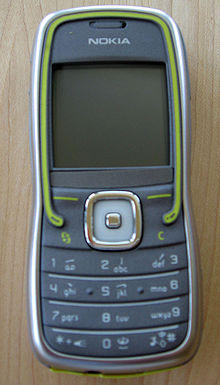Nokia 5500 Sport
 | |
| Predecessor | Nokia 5140 |
|---|---|
| Successor | Nokia 3720 classic |
| Compatible networks | GSM 900/1800/1900 MHz |
| Dimensions | 107 mm x 45 mm x 18 mm (L x W x T) |
| Weight | 103 grams (including battery) |
| Memory | 8 MB (internal) + MicroSD Memory Card |
| Display | 31 x 31 mm / 3.1 x 3.1 cm, 18 bit 208 x 208 pixels |
| Connectivity | USB Mass Storage via Pop-Port, Bluetooth 2.0, Infrared |
Nokia 5500 Sport is a smartphone running Symbian v9.1 operating system and the S60 3rd Edition user interface, announced on 10 May 2006.[1] This was the first Nokia handset ever to feature text to speech and motion sensor features.
Features include:
- Built-in 3D accelerometer: allows phone to act as pedometer/step counter.
- Swap key for quick one-key switching between phone, music, and sports modes.
- Stainless steel body: Built to resist knocks, dust and water splashes.
- Text to speech: Software to read aloud SMS and exercise data.
- Sports tracking: plans, records, and schedules workout sessions.
- Music: Unique tap commands for playing MP3 files.
- Integrated 2-megapixel camera with 4x digital zoom.
Nokia 5500 Sport Music Edition
[edit]Nokia 5500 Sport Music Edition or XpressMusic announced in October 2006 is the music variant model of the Nokia 5500 Sport Model in different color scheme. Its sales package includes added accessories, such as a higher capacity memory card, bike mount and shoulder bag. Apart from that its identical hardware wise to the Nokia 5500 Sport Edition.[2]
Specifications sheet
[edit]| Feature | Specification |
|---|---|
| Form factor | Bar / monoblock |
| Weight | 103 grams (including battery) |
| Dimensions | 107 mm x 45 mm x 18 mm (L x W x T) |
| Volume | 77 cc |
| Talk time | 4 hours |
| Standby time | 270 hours (Up to 10 days) |
| Battery | Li-Ion BL-5B 860 mAh |
| Operating System | Symbian OS (9.1) + Series 60 v3 |
| GSM frequencies | GSM 900/1800/1900 MHz |
| GPRS | Yes, GPRS multislot class 10, up to 62.4 kbit/s |
| EDGE (EGPRS) | Yes, EDGE multislot class 10, up to 236.8 kbit/s |
| 3G | No |
| UMTS/WCDMA | No |
| WLAN/WiFi | No |
| Screen Size | 31 x 31 mm / 3.1 x 3.1 cm |
| Screen Resolution | 208 x 208 pixels |
| Flash Light Torch | Yes |
| Camera | 2.0-megapixel, 4x digital zoom (1600 x 1200, 1152 x 864, 640 x 480 pixels) |
| Video recording | Yes, QCIF (176 x 144 pixels), sub-QCIF (128 x 96 pixels) |
| Voice recording | Yes |
| Text to Speech | Yes, SMS and exercise data read out loud |
| Multimedia Messaging | Yes |
| Video calls | No |
| Push to talk | Yes (Push to Talk over Cellular - PoC) |
| Java support | Yes, MIDP 2.0 |
| Built-in memory | 8 MB |
| Memory card slot | Yes, microSD (Expandable up to 2 GB[3]) |
| Hot Swappable Memory card slot | No |
| Bluetooth | Yes, Bluetooth 2.0 + EDR (Enhanced Data Rate) |
| Infrared | Yes |
| USB Mass Storage class support | Yes, via Pop-Port |
| Data cable support | Yes |
| Browser | WAP 2.0 XHTML / HTML. Comes standard with a full Web browser |
| Yes | |
| Music player | Yes, stereo, MP3, AAC, AAC, eAAC and WMA playback support |
| Radio | Yes, FM Stereo with Visual Radio client |
| Video Player | Yes |
| Stereo Speakers | Yes |
| Ringtones | Yes, Monophonic, Polyphonic, True Tones and MP3 |
| Vibrate | Yes |
| Handsfree Speaker | Yes |
| Offline/Flight mode | Yes |
| Released | Q3 2006 |
| Synchronization | PC: Nokia PC Suite, Over the Air: SyncML |
Known issues
[edit]Some users have complained on the Nokia Support Discussions Board that the Nokia 5500 keypad gets unglued only after a few weeks of light usage, however later release models appear to have had this problem fixed.[4][5]
See also
[edit]References
[edit]- ^ "Nokia 5500 Sport: Smartphone with a six-pack | Nokia". Archived from the original on 28 December 2014. Retrieved 28 December 2014.
- ^ "Nokia 5500 Sport Music Edition - Always on the right track". Nokia. 5 October 2006. Archived from the original on 28 December 2014. Retrieved 14 November 2022.
- ^ Nokia Accessories Page for 2 GB MicroSD Card
- ^ "Nokia Support Discussions - Keypad Peeling Discussion 1". Archived from the original on 6 October 2011. Retrieved 20 December 2006.
- ^ "Nokia Support Discussions - Keypad Peeling Discussion 2". Archived from the original on 16 October 2007. Retrieved 20 December 2006.
